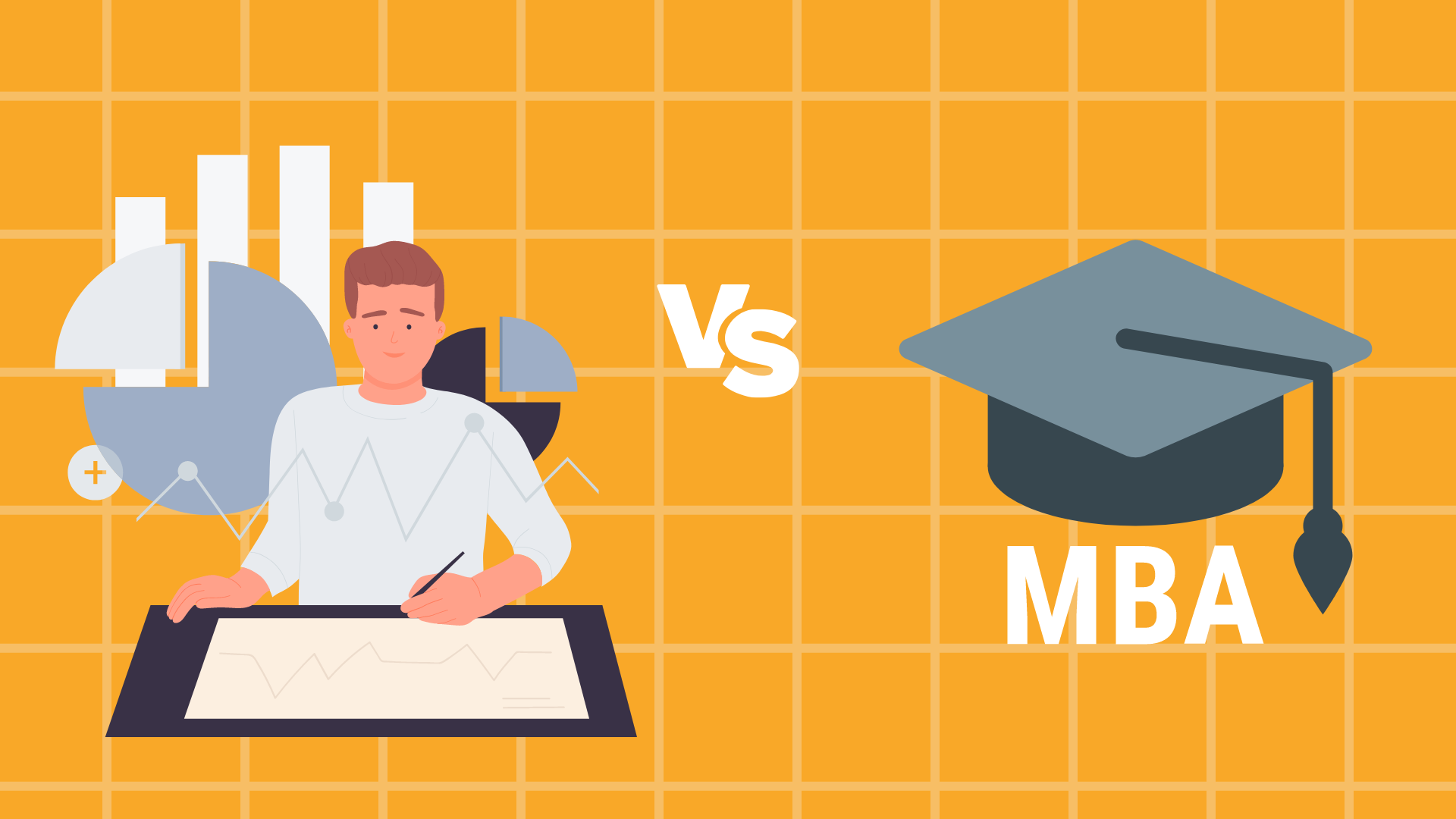Analytics MBA vs. Data Science Master's: 2025 Career Guide
Overview
If you’re looking to level up your career or break into the data sector, sticking with just a bachelor’s degree might limit your opportunities, earning potential, and professional growth. As you explore advanced education options, you might find yourself torn between two popular paths: an Analytics MBA vs. Data Science Master’s.
From an overarching perspective, data science as a field tends to pay more, with master’s degree holders securing a mean weekly earning of $1737, compared to MBAs earning $2206 per week.
While both can be lucrative options, each comes with specific constraints. For instance, cost. MBA programs, regardless of the field, are typically more expensive than master’s programs.
With these unique benefits and challenges, choosing the right path can feel overwhelming. This guide will break down the key differences, from career opportunities to skill sets, to help you confidently decide which path aligns best with your goals.
What Can You Learn in an Analytics MBA?
The objective of data analytics is to find patterns in market and customer behavior to help make better business decisions. A Data Analytics MBA is a specialized Master of Business Administration program designed to equip students with the skills and knowledge needed to identify business problems and understand the bigger picture accurately.
It combines traditional business management principles with advanced data analytics techniques to improve decision outcomes and provide valuable insight regarding risk assessment and benefits associated with specific decisions.
A typical data analytics MBA curriculum lasts between 1 to 2 years, depending on whether you choose a full-time, part-time, or online format. The best curriculums often include data visualization, predictive analysis, business intelligence, marketing analytics, and decision-making models, in addition to core MBA subjects like finance, marketing, and management.
Many, if not all, data analytics MBA programs include real-world projects or internships to apply your learning in practical settings. Other benefits of doing an analytics MBA involve:
- It combines data analysis with business strategy, making graduates versatile.
- A data analytics MBA gives you access to a diverse network of professionals and alumni in various industries.
- Prepares you for leadership roles that require both analytical and managerial skills.
- As businesses increasingly rely on data-driven decisions, MBA graduates are often in high demand.
However, there are also a few drawbacks to an analytics MBA, like higher tuition fees than a traditional master’s program and less technical depth. An MBA program may not provide the same level of technical training as a dedicated data science program.
What Can You Learn in a Data Science Master’s Degree?
The responsibilities of a data scientist involve extracting insights from large datasets and solving complex data problems. Basic data science responsibilities also include gathering data from various sources, identifying data quality issues, cleaning them, and converting raw data into a suitable format for analysis.
With a master’s degree, however, you’ll be on the lookout for data anomalies, whipping up eye-catching visualizations, and flexing your statistical muscles. Depending on your role, you might even get to play around with building and evaluating machine learning models.
Algorithm selection, model training, model evaluation, and hyperparameter tuning could also be included in your job responsibilities.
Depending on the format (full-time, part-time, or online), data science master’s degree programs also typically span 1 to 2 years. The courses, however, include machine learning, data mining, statistical analysis, big data technologies, and programming languages like Python and R. Programs may also include hands-on projects and internships similar to the MBA programs.
Other benefits of doing a data science master’s include:
- You’ll be in high demand across various industries as companies increasingly rely on data-driven decision-making.
- Provides deep technical skills in data analysis, programming, and machine learning.
- It opens up a wide range of roles, from data scientist to machine learning engineer.
- Master’s graduates often command better salaries than bachelor’s.
The main drawback of doing a data science master’s compared to an analyst MBA course is that it may not cover business management topics as comprehensively as an MBA. Moreover, similar to MBA programs, a data science master’s, while comparatively less, also requires a significant financial and time investment.
While MBAs in business analytics and M.S. in Data Science degrees share similarities, there are distinct differences in curriculum and what you can expect to learn.
Generally, MBAs in analytics focus heavily on business analytics and intelligence. In other words, you’ll build domain expertise in how businesses can use data to influence business decisions and generate revenue.
The data science master’s degree, on the other hand, doesn’t necessarily have a business focus. Instead, these degrees cover various topics, including machine learning, statistical analysis, and even data visualization.
MBAs Specializing in Business Analytics
MBA programs are typically offered by a university’s business school and focus primarily on business analytics. These programs allow students to focus on using data science techniques in business to generate value and make informed decisions.
Like most MBA programs, the focus is on business theory. Therefore, data science is used to apply and study those business theories. Key elements of this program include:
- Being offered by a university’s school of business.
- Business analytics or data analytics focused.
- The focus is on business theory, with data science as a tool for studying business theory.
- This may include coursework in data visualization, analytics, and business intelligence.
- Typically looks at analytics’ use in marketing and business intelligence.
Programming coursework varies by MBA program, and some require intermediate skills in languages like Python or SQL. Ultimately, if you pursue an MBA, you may have to supplement your programming studies with additional coursework or a boot camp.
Data Science Master’s
M.S. in Data Science programs typically offer through a university’s computer science, math, or engineering department. Therefore, these degrees tend to be focused on the math theory of data science rather than the practical applications of data science in business.
These degree programs also dive deeply into foundation knowledge of data science, including concepts like statistical modeling and machine learning. A few key distinctions include:
- Offered by university’s mathematics, engineering, or computer science schools.
- Scientifically driven, focused on mastering core data science concepts.
- Dives deeply into programming, including coursework focused on SQL, Python, R, or Java.
- Focus on mathematics and statistics.
- Not necessarily focused on analytics or business; may include study in subject areas like public health or urban planning.
One thing to note: Many data science positions require business acumen. Knowing this, business sense is often taught on the job, and many master’s programs in data science offer business coursework.
How to Decide Between Analytics MBA vs. Data Science Master's
Now that we’ve got the basics of both career paths squared away, let’s dive into some critical factors that should guide your decision-making. When faced with choosing between an Analytics MBA and a Master’s in Data Science, there are a few things to consider—besides which one sounds fancier on LinkedIn!
Let’s break down the key factors to help you make the best choice for your career.
Career Goals
Ask yourself if you see yourself in a management or executive role, making strategic decisions using data. If so, an Analytics MBA is better suited for leadership positions with better perks where data informs business decisions. On the other hand, if you aim to work directly in technical roles, like a Data Scientist or Machine Learning Engineer, a Master’s in Data Science will give you the tools to excel.
Depending on your choice, certain industries prefer one degree over the other. For instance, tech-driven companies may favor the technical expertise of a Master’s in Data Science, while more traditional industries, such as finance and marketing, often look for leadership combined with analytical skills from an MBA.
Educational and Technical Skills
Your current educational background and comfort with technical subjects should also influence your decision.
For instance, an analytics MBA requires basic data analysis skills, such as understanding data trends and using business intelligence tools like Excel, Tableau, or Power BI. It focuses on business applications of data rather than deep technical knowledge. This path is ideal for those with a non-technical background or those looking to combine data skills with broader business knowledge.
In contrast, a master’s in data science demands strong technical skills in programming, statistics, machine learning, and big data technologies. If you already have a background in math, statistics, or computer science, or enjoy working with complex algorithms, this program is likely to suit you better.
Industry Preference
As mentioned, tech, AI, healthcare, and finance are the key industries that often require professionals with data science expertise to handle large datasets, build predictive models, and develop AI applications. A Master’s in Data Science will give you the technical edge to break into these fields.
Other industries, such as consulting, marketing, and traditional corporate sectors, value business leadership and decision-making skills. An Analytics MBA may be the better route if you’re targeting roles in management consulting, business strategy, or product management, where combining data and business insight is key.
Cost and Time Commitment
Analytics MBA programs generally cost more, often ranging from $50,000 to $100,000 or more, and typically take 1-2 years to complete. However, they often include broader business training and networking opportunities.
Master’s in Data Science curriculums are typically less expensive, with tuition ranging from $20,000 to $60,000, and may also take 1-2 years to complete. While more affordable, the focus is almost entirely on technical skill development, with less emphasis on business management.
Networking Opportunities
One of the biggest advantages of pursuing an MBA, especially from a prestigious school, is the built-in networking opportunities. You’ll often have access to an extensive alumni network across various industries, which can open doors to leadership roles, internships, and consulting opportunities. Moreover, MBA programs often emphasize peer-to-peer interaction, group projects, and events that help build strong professional relationships.
Personal Preferences
Ultimately, your personal interests and work style should guide your decision.
If you thrive on strategy, enjoy managing teams, love communicating data insights, and prefer making high-level business decisions, an MBA with an analytics focus should be your priority But if you’re the type who gets excited about diving deep into code and tackling complex technical challenges, then a data science master’s will feel more like your ideal toolkit—complete with a lot of Python and maybe some late-night debugging.
Jobs for Analytics MBAs
If you’re interested in statistics and science or data science, for example, designing A/B testing experiments, then a traditional data science master probably makes more sense. Generally, a business analytics MBA will prepare you for these types of data science roles:
- Business analyst
- Product manager/analyst
- Marketing analyst
- Business intelligence analyst
- Growth marketing analyst
- Business ops roles
One advantage of an MBA is that it offers more job diversity if you choose a career outside of data science. For example, an analytics MBA would also prepare you for finance, accounting, and marketing roles.
Jobs for M.S. in Data Science
A traditional data science master’s prepares candidates for data science, machine learning, and research-related roles. You might choose a data science master’s degree if you’re interested in these roles:
- Data/Machine Learning Engineer
- Data Scientist
- Research Scientist
- Data Analyst
- AI/Deep Learning Specialist
The Bottom Line
Choosing between an Analytics MBA and a Master’s in Data Science ultimately comes down to your career goals, personal strengths, and the direction you want to take in the data-driven world. If you’re drawn to leadership and business strategy and enjoy using product metrics to drive company-wide decisions, an Analytics MBA will set you up for success in managerial roles.
However, if you’re passionate about coding, machine learning, and solving complex technical projects, a Master’s in Data Science will give you the specialized skills needed for highly technical, data-focused roles and the ability to crack data science interviews.
All the best!

